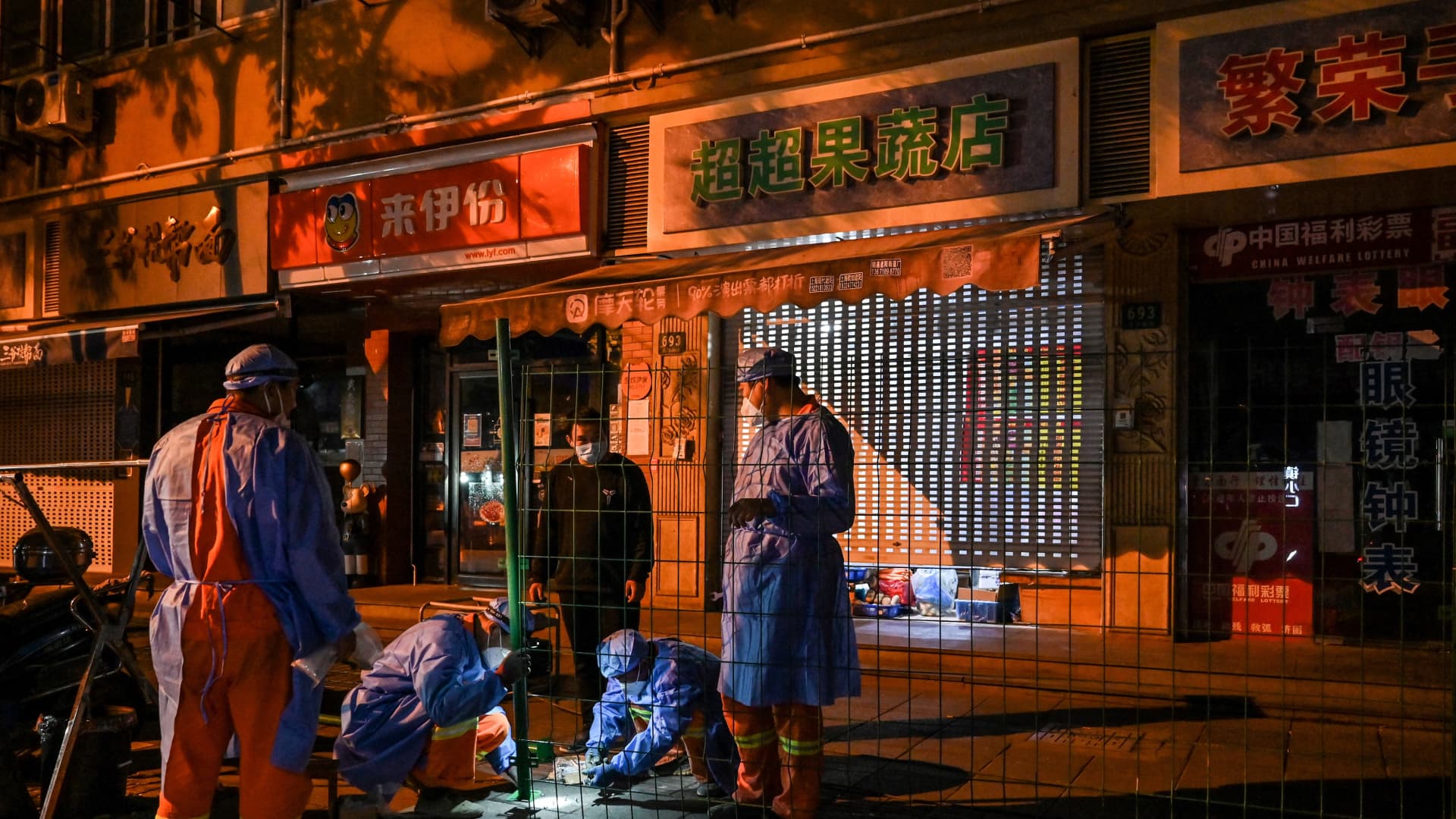[ad_1]
Workers in Shanghai’s Changning district put up fencing on Oct. 7, 2022, around a neighborhood lockdown after reports of new Covid cases.
Hector Retamal | Afp | Getty Images
BEIJING — New Covid cases are spiking across mainland China, prompting many local authorities to tighten controls on movement.
About 4.8% of China’s gross domestic product was negatively affected by Covid controls as of Monday, according to a model from Nomura. That’s up from 4.3% a week ago.
Three of Shanghai’s downtown districts on Monday ordered entertainment venues such as internet cafes to close temporarily, according to official announcements.
On Tuesday, many schools in the central Chinese city of Xi’an cancelled in-person classes for most students, according to a local news outlet. A hashtag about the sudden closures was one of the top-trending items on Weibo, China’s Twitter-like social media platform.
Xi’an‘s education department did not immediately respond to a CNBC request for comment.
The measures follow a week-long National Day holiday that ended Friday, during which “China’s overall Covid situation appears to have deteriorated materially,” Nomura’s chief China Economist Ting Lu and a team said in a note Monday.
The report pointed to the lockdown since Oct. 4 of a popular tourist city in southern Yunnan province, Xinjiang’s ban on people leaving the region due to a local Covid outbreak, and a lockdown in the city of Haikou on Hainan province on Oct. 6.
The seven-day moving average of locally transmitted Covid infections with symptoms more than doubled from 136 on Oct. 1 to 305 on Oct. 9, Nomura’s analysts said.
Mainland China reported 427 new symptomatic Covid cases for Monday in more than 20 of the country’s province-level regions. When adding infections without symptoms, the daily case count surpassed 2,000 and came from nearly all of the 31 province-level regions.
Domestic tourism revenue during the holiday this month — China’s last public holiday of the year — came in at 287.21 billion yuan ($40.45 billion), according to China’s Ministry of Culture and Tourism. That was down from last year and remained well below 2019 levels, the ministry said.
However, online booking platform Trip.com said nearly two-thirds of holiday orders were for nearby travel or staycations, for which spending rose by 30% year-on-year.
Stringent virus testing requirements and risk of not being able to return home have discouraged long-distance domestic travel on the mainland.
That contrasts with a surge of travel overseas as Hong Kong, Taiwan, Japan and South Korea have joined other countries in relaxing quarantine and virus testing rules.
Sticking to zero-Covid
This October is a particularly politically sensitive time for China as President Xi Jinping is expected to consolidate his power at a key meeting of the ruling Chinese Communist Party next week.
Ahead of that congress, central government authorities affirmed their dynamic zero-Covid policy in an article Monday in the party’s newspaper, People’s Daily.
State broadcaster CCTV summed up the article in its nightly news program by emphasizing the need for an even more targeted approach to controlling Covid.
“We must remain vigilant against the spread of the pandemic, overcome paralyzed thinking, weariness of war, a mentality of taking chances and an attitude of taking it easy — and conscientiously do the work of pandemic prevention and control,” the broadcaster said, according to a CNBC translation of the Chinese.
[ad_2]
Image and article originally from www.cnbc.com. Read the original article here.

